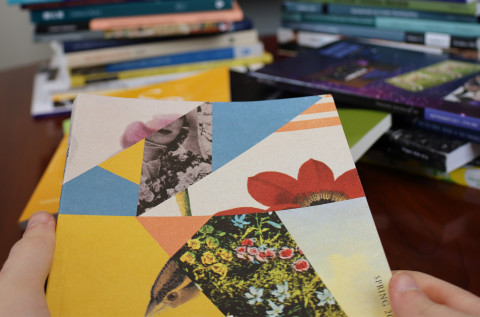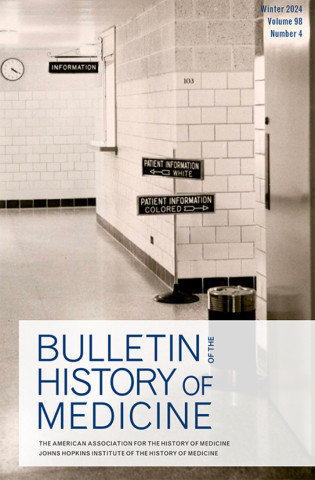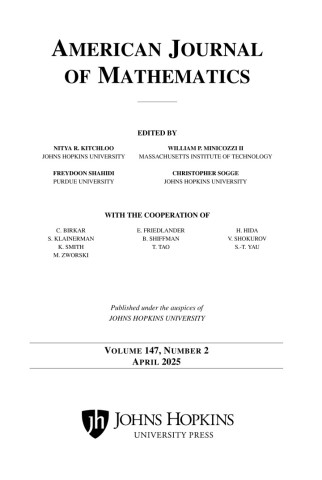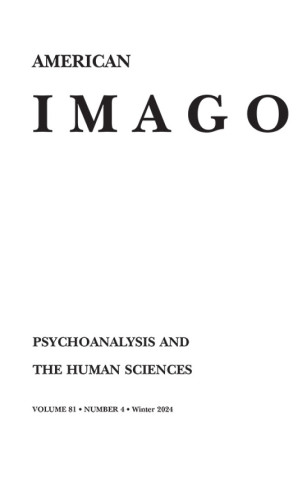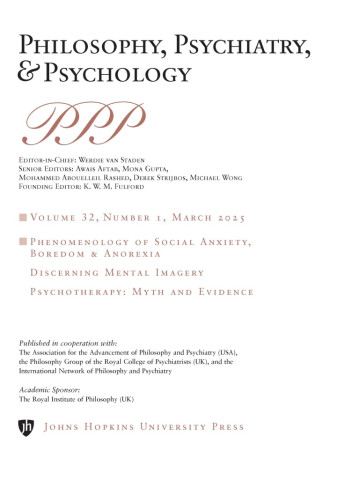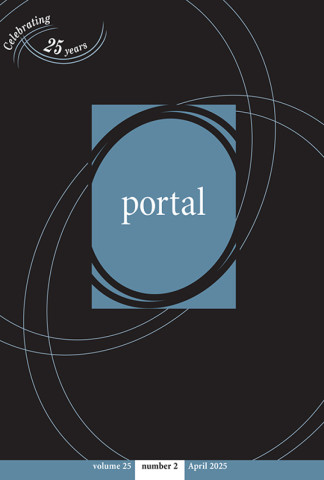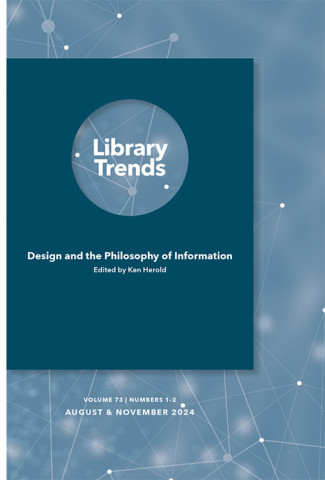

Library Trends
Journal Details
Online: 1559-0682
Hopkins Press does not require potential contributors to pay an article submission fee in order to be considered for publication in any of the Journals that we publish. Any other website that purports to be affiliated with a Hopkins Press Journal and that requires you to pay an article submission fee is fraudulent. Do not provide payment information. Instead, we ask that you contact William Breichner, Hopkins Press Journals Publisher: wbreich1@jh.edu.
Library Trends only accepts manuscripts in response to calls for papers.
Under the guidance of Melissa A. Wong, editor in chief, Library Trends provides an outlet for individuals to serve as guest editors for a special topic, exploring a key area of activity or interest in librarianship. Guest editors are selected by Wong, with the advice of the Editorial Board and based on the content of submitted proposals.
A guest editor proposes the theme and scope of a new issue, draws up a list of prospective authors and article topics, calls for submissions to the issue, arranges for review of the manuscripts, provides short annotations of each article’s scope, and prepares a statement of philosophy guiding issue development.
Issue topics for Library Trends are developed in many ways. We value recommendations from professional librarians, archivists, and other information personnel, from members of the faculties of schools of library and information science, and from others whose concern is with issues of the management of cultural heritage. We seek volunteers from these areas to act as guest editors.
The style and tone of the journal is formal rather than journalistic or popular. Library Trends reviews current theory and practice and identifies and evaluates new directions for both practice and research. Papers must represent original work. Extensive updates of previously published papers are acceptable, but revisions or adaptations of published work are not acceptable. Both issue proposals and the papers they contain are subject to rigorous external review.
If you would like to submit a proposal, it should include the nature and scope of the proposed topic and suggestions of the names of individuals whom you hope would contribute the articles. For ease of review, please submit your CV and a proposal using the following format:
1.Guest editor name and contact information
2.Proposed issue theme/draft issue title
3.Description of the nature and scope of the issue’s topic (300-500 words)
4.List of potential articles (8-10 articles)
5.List of potential authors to solicit (8-10 authors)
6.List of potential reviewers for the manuscripts (4-5 reviewers)
7.Proposed timeline for proposals, authoring, editing, etc. (12-14 months typical)
Please send your ideas, inquiries, or issue proposal to librarytrends@illinois.edu.
The guest editor is responsible for adhering to the deadlines and page limits established by Library Trends editorial staff. They will notify the Library Trends managing editor, Natasha Sims (librarytrends@illinois.edu), regarding progress in the development of the issue, issues that may occur with securing manuscripts, and problems with the content of manuscripts.
Throughout the entire production process, the managing editor will remain in close contact with the guest editor. If at any point in the process the guest editor and authors have questions, they should immediately contact the managing editor.
The Production Process
1.The guest editor(s) will provide an ordered table of contents to the editor-in-chief as well as a list of all contributing authors, including for each an email address and daytime telephone number.
2.Having completed the review process and confirmed that the article manuscripts follow the “Author Instruction for the Preparation of Articles,” the guest editor(s) will provide the articles to the journal’s general editor for review and approval.
3.All articles will be reviewed and approved by the journal’s editor-in-chief. For articles that are approved, revisions may be requested on occasion.
4.The journal’s managing editor will review for completeness all material submitted— including abstracts, author biographies, tables, figures, etc.—to be included in the respective articles. Any questions at that time will be referred to the issue editor.
5.The managing editor will send publishing agreements to authors and may need assistance from the issue editor in obtaining the authors’ signatures. Government employees may need to sign a separate publishing agreement (articles provided under governmental auspices need to be accessible in the public domain, and copyright cannot be transferred). Translation permission forms also will be required if the issue includes articles that have been translated into the English language.
6.The managing editor will assist authors with the process required to obtain written permission to reprint any copyrighted material (photos, illustrations, etc.), whether previously published or not, that falls outside the bounds of fair use. Production cannot proceed until all forms are signed and on file.
7.Manuscripts will be submitted by the managing editor to the journal’s publisher, The Johns Hopkins University Press, for production of the issue: copy editing, typesetting, proofreading, and preparing files for printing.
8.Copy editing consists of reviewing the manuscripts for style, format, organization, spelling, grammar, punctuation, and reference consistency; this process takes 6-8 weeks. It does not include substantial content editing, which is the responsibility of the guest editor prior to submission. During the copy-editing stage, authors will be given an opportunity to review their manuscripts and asked to answer any questions (articles authored by more than one person will be sent to the lead author). If the author(s) cannot review the article, the guest editor will need to answer any outstanding editorial queries.
9.When copyedits have been reviewed and approved, the issue will be typeset. A complete set of page proofs will then be sent to a proofreader, who will closely read the issue; this process takes 2-3 weeks. Thereafter, the managing editor will review the proofs and resolve with the authors any queries raised by the proofreader (which also takes 2-3 weeks). The guest editor’s role at this stage is to review any article they have authored, as well as to assist the managing editor in resolving queries if the authors are not available to review their articles.
10.Finally, the issue will be sent to the printer; approximately 4 weeks later, advance copies will be available. Complimentary digital copies for the guest editor(s) and all authors will be emailed shortly thereafter. PDF files of individual articles will be available upon request by contacting the managing editor, Natasha Sims, at librarytrends@illinois.edu.
Rethinking Readers’ Advisory for Today’s Reading Reality
Readers’ Advisory is widely considered a core service at all libraries, but that doesn’t mean this old stand-by couldn’t benefit from a new approach. Since 2020 the way readers interact with their library’s leisure collections—from how they access materials to the dangerous increase in book challenges—has profoundly altered the effectiveness of pre-pandemic readers’ advisory tactics. In a world of challenges to the Freedom to Read and in the face of budget cuts, making sure books by all voices and for all readers are easily discoverable, proudly promoted and recommended by all staff, and available for checkout, is vital for our survival.
Library Trends will explore innovative Readers’ Advisory concepts and approaches that reflect critically on the ways in which we serve leisure readers across a wide landscape.
The journal welcomes articles that address both longer theoretical discussions and present shorter, practical applications of service to leisure readers. Perspectives from publisher, independent bookstore owners and/or authors about how they promote books to readers will also be considered.
Potential topics include:
- The ways in which RA Service and its practitioners can advance professional commitments to equity, access, and social justice.
- An appreciation of RA as a core service that entails continuing education and intentional, internal training for all library staff.
- RA Service as a vehicle for transformative change in response to community needs.
- Reexamination of tried-and-true practices in new and innovative ways, such as displays, genre shelving, stickers, book discussions, etc.
- Rethinking how we serve readers, especially articles that center the patron experience.
- Communicating the importance of RA innovation to stakeholders.
- Programs that include all staff in providing service to readers, across the organizational structure.
- What it means to promote reading in ways that undermine structural inequities in book culture.
- Bridging the physical-virtual divide in service to leisure readers.
- Using the catalog as a RA tool.
- For the school environment specifically: navigating two patron types—teacher and student.
- For the academic environment specifically: making space and advocating for leisure reading as vital to student success
- Providing service to leisure readers outside of library and school specific spaces.
- Promotion of reading in library adjacent spaces such as bookstores, by publishers, and in the ways authors connect with their readers.
Article Length: 2,000-6,000 words with the possibility of longer pieces up to 8,500 words (not including bibliography references).
Prospective authors are invited to submit an abstract outlining their proposed article at this link by August 1, 2025. Decisions about the abstracts will be communicated by August 22, 2025, and authors of successful submissions will have a due date of January 15, 2026, for their articles.
Important dates
- August 1, 2025 – Article proposals due
- August 22, 2025 – Author notifications
- January 15, 2026 – Article manuscripts due
- February 1, 2026 – Peer reviews assigned
- March 1, 2026 – Peer reviews due back to guest editors
- April 1, 2026 – Guest editor feedback due back to authors
- May 1, 2026 – Revised articles due to guest dditors
- July 1, 2026 – Final articles due to Library Trends
- November 2026- Publication of issue 75 (2) of Library Trends
Inquiries about the planned issue and ideas for articles should be directed to Guest Editors Robin Bradford (robin.bradford@gmail.com) and Becky Spratford (bspratford@hotmail.com) . Proposals for articles should be submitted via an online proposal form. Proposals are due August 1, 2025.
Citation style: For proposals, authors may use any citation style. For manuscripts, authors should use the Chicago Manual of Style’s author-date format.
The issue will use an open peer review process in which article authors review two manuscripts by other contributors. As part of submitting an article proposal, authors will be asked to commit to participation in this process as both an author and a reviewer.
More information about the journal, including author instructions, is available on the Library Trends website.
Please review the Library Trends Guest Editor and Author Handbook to learn more about the production process, review helpful guidelines, and find answers to frequently asked questions.
The Hopkins Press Journals Ethics and Malpractice Statement can be found at the ethics-and-malpractice page.
Peer Review Policy
Each issue of Library Trends is a special-topic issue and is overseen by one or more guest editors. Articles are invited or the result of a call for proposals. The guest editors manage a peer review process for each issue and draw upon a reviewer pool developed for their expertise around that issue's topic. The process may be single-blind, double-blind, or open at the discretion of the guest editors.
Editor in Chief
Melissa A. Wong, University of Illinois Urbana-Champaign, USA
Managing Editor
Natasha Sims, University of Illinois Urbana-Champaign, USA
Assistant Managing Editors
Evan M. Allgood, University of Illinois Urbana-Champaign, USA
Chloe E. Miller, University of Illinois Urbana-Champaign, USA
Editorial Board
Hermina G.B. Anghelescu, Wayne State University, USA
Tiago Emmanuel Nunes Braga, Brazilian Institute for Information in Science and Technology, Brazil
Camille Callison, University of the Fraser Valley, Canada
Lisa Janicke Hinchliffe, University of Illinois Urbana-Champaign, USA
Noah Lenstra, University of North Carolina at Greensboro, USA
Rachel M. Magee, University of Illinois Urbana-Champaign, USA
Amal W. Mostafa, Cairo University, Egypt
Travis L. Wagner, University of Illinois Urbana-Champaign, USA
Yuxiang (Chris) Zhao, Nanjing University, China
Abstracting & Indexing Databases
- Clarivate Analytics
- Current Contents
- Web of Science
- De Gruyter Saur
- Dietrich's Index Philosophicus
- IBZ - Internationale Bibliographie der Geistes- und Sozialwissenschaftlichen Zeitschriftenliteratur
- Internationale Bibliographie der Rezensionen Geistes- und Sozialwissenschaftlicher Literatur
- EBSCOhost
- Academic Search Alumni Edition, 1/1/1993-
- Academic Search Complete, 1/1/1993-
- Academic Search Elite, 1/1/1993-
- Academic Search Premier, 1/1/1993-
- Academic Search: Main Edition, 1/1/1993-
- Biography Index: Past and Present (H.W. Wilson), vol.38, 1989-vol.56, no.4, 2008
- Book Review Digest Plus (H.W. Wilson), Apr.1984-
- Business Source Corporate, 1/1/1993-, dropped
- Business Source Corporate Plus, 1/1/1993-
- Corporate ResourceNet, 1/1/1993-
- Current Abstracts, 1/1/2000-
- Education Abstracts (H.W. Wilson), 4/15/1984-
- Education Index (Online), 1984/04-
- Education Research Complete, 1/1/1993-
- Education Research Index, Jan.1993-
- Education Source, 4/15/1984-
- Information Science & Technology Abstracts, 1/1/1993-
- Library & Information Science Source, 1/1/1937-
- Library Literature & Information Science Full Text (H.W. Wilson), 04/15/1984-
- Library Literature & Information Science Index (H.W. Wilson), 4/15/1984-
- Library Literature & Information Science Retrospective: 1905-1983 (H.W. Wilson), 1/1/1937-12/16/1983
- Library, Information Science & Technology Abstracts (LISTA), 1/1/1966-
- MainFile, 1/1/1993-
- MasterFILE Complete, 1/1/1993-
- MasterFILE Elite, 1/1/1993-
- MasterFILE Premier, 1/1/1993-
- MasterFILE: Main Edition, 1/1/1993-
- MLA International Bibliography (Modern Language Association)
- OmniFile Full Text Mega (H.W. Wilson), 4/15/1984-
- Professional Development Collection, 1/1/1993-
- Professional Development Collection: Main Edition, 1/1/1993-
- Public Affairs Index, 6/1/1993-
- RILM Abstracts of Music Literature (Repertoire International de Litterature Musicale)
- Russian Academy of Sciences Bibliographies
- TOC Premier (Table of Contents), 1/1/1995-
- Elsevier BV
- Scopus, 1980-
- FRANCIS
- Gale
- Business & Company ProFile ASAP, 1/2000-
- Business ASAP, 1/2000-
- Business ASAP International, 1/2000-
- Business Insights: Essentials, 06/1978-
- Business Insights: Global, 06/1978-
- Gale Academic OneFile, 06/1978-
- Gale Academic OneFile Select, 06/1978-
- Gale General OneFile, 06/1978-
- Gale in Context: College
- Gale in Context: Elementary
- Gale OneFile: Business, 06/1978-
- Gale OneFile: Educator's Reference Complete, 06/1978-
- Gale OneFile: High School Edition, 01/1985-
- Gale OneFile: Information Science, 06/1978-
- Gale OneFile: Leadership and Management, 06/1978 -
- Gale OneFile: Popular Magazines, 06/1978-
- General Business File ASAP, 1/2000-
- General Reference Center, 06/1978-
- General Reference Center Gold, 06/1978-
- General Reference Centre International, 1/1980-
- InfoTrac Custom, 1/1980-
- MLA International Bibliography (Modern Language Association)
- Student Resources in Context, 06/1978-
- Gale In Context: Canada, 06/1978-
- Gale in Context: High School
- Magazine Index Plus, Jan.1998-
- National Library of Medicine
- PubMed
- OCLC
- ArticleFirst, vol.38, no.3, 1990-vol.60, no.1, 2011
- Education Index (Online), 1984/04-
- Electronic Collections Online, vol.54, no.1, 2006-vol.60, no.1, 2011
- Library Literature, vol.32, 1984-vol.59, no.1/2, 2010
- Periodical Abstracts, v.36, n.3, 1988-v.59, n.1/2, 2010
- Personal Alert (E-mail)
- ProQuest
- Advanced Technologies & Aerospace Database, 1/1/1988-, dropped
- Education Collection, 1/1/1988-
- Education Database, 1/1/1988-
- Library & Information Science Collection, 01/01/1988-
- Library Science Database, 01/01/1988-
- LISA: Library & Information Science Abstracts (Online), Core Coverage - Actively Indexed
- MLA International Bibliography (Modern Language Association)
- PAIS Archive, vol.6, 1957-vol.25, no.2, 1976
- Periodicals Index Online
- Professional ProQuest Central, 01/01/1988-
- ProQuest 5000, 01/01/1988-
- ProQuest 5000 International, 01/01/1988-
- ProQuest Central, 01/01/1988-
- ProQuest Professional Education, 01/01/1988-
- ProQuest SciTech Collection, 1/1/1988-
- Research Library, 01/01/1988-
- RILM Abstracts of Music Literature (Repertoire International de Litterature Musicale)
- SciTech Premium Collection, 1/1/1988-, dropped
- Social Science Premium Collection, 01/01/1988-
- Technology Collection, 1/1/1988-, dropped
- VINITI RAN
- Referativnyi Zhurnal, coverage dropped
Abstracting & Indexing Sources
- Chicano Index (Ceased) (Print)
- Children's Literature Abstracts (Ceased) (Print)
- Family Index (Ceased) (Print)
- Legal Information Management Index (Ceased) (Print)
- Personnel Literature (Ceased) (Print)
- Middle East: Abstracts and Index (Researched / Unresolved) (Print)
Source: Ulrichsweb Global Serials Directory.
0.3 (2024)
0.7 (Five-Year Impact Factor)
0.00027 (Eigenfactor™ Score)
Rank in Category (by Journal Impact Factor):
137 of 166 journals in “Information Science & Library Science”
© Clarivate Analytics 2025
Published quarterly.
Readers include: College and research libraries, public libraries, library systems and networks, special libraries, and international college and research libraries
Print circulation: 261
Print Advertising Rates
Full Page: (4.75 x 7.5”) - $375.00
Half Page: (4.75 x 3.5”) - $281.00
2 Page Spread - $563.00
Print Advertising Deadlines
February Issue – December 15
May Issue – March 15
August Issue – June 15
November Issue – September 15
Online Advertising Rates (per month)
Promotion (400x200 pixels) – $281.00
Online Advertising Deadline
Online advertising reservations are placed on a month-to-month basis.
All online ads are due on the 20th of the month prior to the reservation.
General Advertising Info
For more information on advertising or to place an ad, please visit the Advertising page.
eTOC (Electronic Table of Contents) alerts can be delivered to your inbox when this or any Hopkins Press journal is published via your ProjectMUSE MyMUSE account. Visit the eTOC instructions page for detailed instructions on setting up your MyMUSE account and alerts.
Hopkins Press Journals
